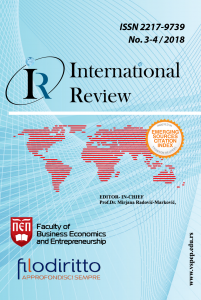The economic aspect of special parallel relations between the Republic Serbia and the Republic of Srpska in accordance with the Dayton peace agreement
The economic aspect of special parallel relations between the Republic Serbia and the Republic of Srpska in accordance with the Dayton peace agreement
Author(s): Rajko TomašSubject(s): Economy, Business Economy / Management, Agriculture, Accounting - Business Administration, Business Ethics
Published by: Visoka škola za poslovnu ekonomiju i preduzetništvo
Keywords: Dayton Peace Agreement; special parallel relations; economic cooperation; Linder hypothesis
Summary/Abstract: The General Framework Agreement for Peace (Dayton Peace Agreement) in Bosnia and Herzegovina (B&H) gave the right to entities that make B&H to establish special parallel relations with adjoining countries. That possibility was so far used by the Republic of Serbia and the Republic of Srpska, as an entity within B&H. In this paper, we examine economic aspect of special parallel relations between Serbia and the Republic of Srpska. Demand structure in Serbia and the Republic of Srpska is similar, due to which we have put our analysis in the context of Linder hypothesis. Empirical analysis has confirmed that the two economies have a high level of similarity of export and that they are severe competition in the third markets. Both economies have a high level of economy diversification and a low level of export diversification. According to the logic of Linder hypothesis, economies of Serbia and the Republic of Srpska can use a relatively big potential possibilities of economic cooperation by the increase of specialization in production, i.e. by reducing economy diversification and increasing export diversification. It can be achieved by innovations in development of economies and their differentiation.
Journal: International Review
- Issue Year: 2018
- Issue No: 3-4
- Page Range: 123-139
- Page Count: 17
- Language: English

